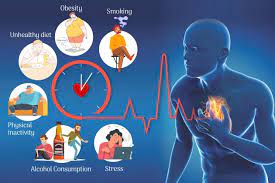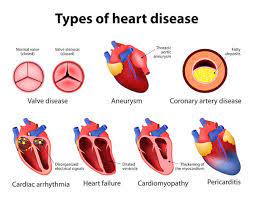Heart diseases include a range of conditions that affect your heart. It includes various diseases like blood vessels disease, such as coronary artery disease, heart rhythm problems and heart defects you are born with. The term heart disease is often used interchangeably with the term cardiovascular diseases. it involves, in general, the narrowing of the artery or blocked blood vessels that leads to the heart attack, chest pain or stroke. Many of such disease connected with a heart can be treated or can be prevented by healthy lifestyle choices.

Symptoms of the heart disease
if the arteries are narrow they cannot supply the oxygen-rich blood to the heart, especially when it is beating hard, such as when you are running. At the beginning, the decreased blood flow may not cause any coronary arteries symptoms. But as the plague continues to build up in coronary arteries, you may develop coronary artery disease signs and symptoms which include:
- Chest pain: The person may feel the pressure of tightness in the chest area. This pain is referred as angina, it generally occurs in the middle or on to the left side of the chest. Pain is generally triggered by either physical or emotional stress. the pain will stop as after the stressful activity is stopped. In some people especially women the pain will be sharp and felt in the neck, arm or back.
- Shortness of breath: If the heart is unable to pump enough blood to meet your body’s need you may develop shortness of breath or extreme exhaustion with exertion.
- Herat attack: If the artery is completely blocked it may result in heart attack. The general signs and symptoms of the heart attack neck pain and jaw pain. Sometimes attack occurs without any noticeable signs or symptoms.
Types of Heart Diseases
- Coronary Artery Disease (CAD) CAD occurs when the blood vessels supplying the heart muscle become hardened and narrowed due to the buildup of plaque, restricting blood flow to the heart.
- Heart Failure Heart failure happens when the heart cannot pump blood effectively, leading to inadequate circulation and oxygen delivery to the body’s tissues.
- Arrhythmias Arrhythmias are abnormal heart rhythms, which can cause the heart to beat too fast, too slow, or irregularly, disrupting its ability to pump blood efficiently.

Risk factors include
- Age: simply getting older increases the risk of damage and narrowing of the arteries.
- Sex: Men are generally at the greater risk coronary artery disease. However, the risk for women increases after the menopause.
- Family History: if the heart problems are running in family the associated person is at higher risk even at the early age they develop heart-related problems.
- Smoking: People who are in habit of smoking are at the risk of heart disease. Also for those who are continuously exposed to the smoke are at the risk.
- High blood pressure: Uncontrolled high blood pressure can result in hardening and thickening of your arteries, and narrowing of the channels through which the blood is supplied to the heart.
- High blood cholesterol levels: high level of cholesterol in your blood can increase the formation of plaques and can cause blockage in the artery.
- Other factors include obesity, high-stress level and no physical activity.
Conclusion
Understanding heart disease and its risk factors empowers individuals to take proactive measures to safeguard their heart health. By adopting a heart-healthy lifestyle, staying vigilant about potential symptoms, and seeking timely medical advice, we can combat the silent killer that is heart disease.
Best packages Information visit here:- https://www.docopd.com/en-in/lab


